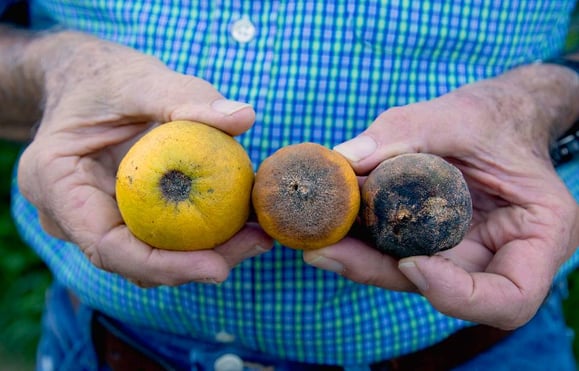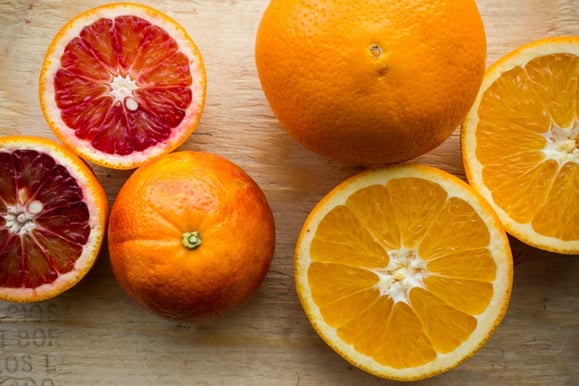Our Florida citrus supplier, Uncle Matt’s, has been sending us exceptional navels, Cara Caras, grapefruit and Minneolas this winter, but bringing you fresh, organic fruit from a region hit hard by a pernicious disease and its insect carrier, the Asian citrus psyllid, has become an increasingly herculean task.
What is Citrus Greening?
Huanglongbing (HLB), commonly known as citrus greening, is a bacterial infection of the vascular and root systems of citrus trees that starves them of vital nutrients. It is spread by the Asian citrus psylllid, a small winged insect which sucks the sap of citrus trees, introducing the bacteria from tree to tree. The fruit of affected trees grows lopsided, remains green and produces sour fruit unfit for eating or juicing. It can affect forty to 100 percent of a tree’s fruit.

Citrus Greening and the Spread to US Crops
First discovered in China in the 1920s, HLB was largely limited to Asia until the early 2000s. In 2004, infected trees were found in Brazil, followed by Florida a year later. Since discovering the first infected tree in 2005, Florida has seen an 82% decrease in orange production. The effects of greening in Florida are ominous harbingers for Texas and California citrus. Texas has seen several infections since 2012 that have halted production until effective quarantines could be put in place. Southern California has recently found psyllids and trees testing positive for HLB and initiated quarantines. No citrus producing region in the world, once HLB and psyllids are established, has managed to eradicate the disease.
In Florida, the prevalence of untended groves has contributed to dwindling harvests and also made the fight against HLB a much harder task. Hurricanes in 2004 and 2005 decimated citrus groves and the 2008 real estate crisis depreciated land to the point that some growers had no choice but to foreclose and give up their land. Empty groves become both an incubator for HLB and a sanctuary for psyllid populations that can then spread to neighboring properties.
The economic impacts of HLB have been staggering. The University of Florida estimates that HLB has cost Florida $4.5 billion and wiped out 8,300 jobs. One analysis has shown that a tree infected with HLB can fall below the threshold for economic viability in as little as seven years. At that point growers have to remove the tree, sterilize the soil and replant. However, newly planted saplings are particularly vulnerable to the psyllid, as their new foliage is especially attractive. The likelihood of re-infection is very high.
Greening Is Harder on Organics

As is often the case in organic farming, there is no silver bullet for HLB. While dramatic and costly increases in pesticide use have been the prevalent strategy for conventional growers, smart thinking and an arsenal of natural solutions have made Uncle Matt’s a leader in finding an organic solution. Their cooperation with University of Florida scientists has led to some promising results. Use of naturally derived neem oil, pyrethrins and other botanical oils helps to keep psyllids at bay. As founder and namesake, “Uncle” Matt McLean, describes in this video, deploying spiders, lacewings and parasitic wasps has also proven a winning strategy. Soil health has always been an emphasis for Uncle Matt’s. Applications of micronutrients, seaweed and molasses ensure healthy soil with ample nutrients and vigorous biological activity. Studying “survivor” trees—trees that have a natural resistance to greening—also holds promise.
While the outlook for the Florida organic citrus industry seems grim, we are thankful to still have a steady supply of citrus from the Sunshine State. Uncle Matt’s citrus tastes that much sweeter knowing that supporting them means supporting responsible growing and keeps alive the hope for a breakthrough in the fight against citrus greening.
More information about citrus greening can be found at Uncle Matt’s and the University of Florida website.



